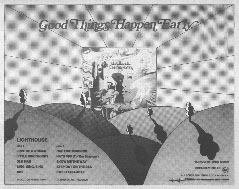![]()
  |

One Fine Morning
Lighthouse
Evolution 3007
Released: July 1971
Chart Peak: #80
Weeks Charted: 21
 Following the pop music scene in Canada teaches one many and myriad virtues, not the least of which is patience. Canadian groups, no matter how highly touted at the offset, seem to require a considerably longer period of time to mature than their English and American counterparts. You will almost never find a Canadian artist coming out with a commendable album the first time around, and Lighthouse was certainly no exception.
Following the pop music scene in Canada teaches one many and myriad virtues, not the least of which is patience. Canadian groups, no matter how highly touted at the offset, seem to require a considerably longer period of time to mature than their English and American counterparts. You will almost never find a Canadian artist coming out with a commendable album the first time around, and Lighthouse was certainly no exception.
One Fine Morning is Lighthouse's fourth album, and their first since their split from RCA. For those unfamiliar with the group's history, I now humbly offer a rundown of efforts one through three.
1. Lighthouse (RCA) Their first, a hideous disaster. Horrible production meets bland material, and everybody loses. The Young Canadian Rock Fan's expectations are crushed into the hardy Tundra.
2. Suite Feeling (RCA) A considerable improvement, with one lengthy satisfying jam on it. Still no great shakes, but it caused Y.C.R.F. to wipe the mud off and take heart for number three.
3. Peacing It All Together (RCA) A fair album by anyone's standards. The writing team of Skip Prokop and Paul Hoffert is by now starting to write interesting and original material. Unfortunately, the album has flaws, and just doesn't hold the listener's attention as a really good record should.
 Click image for larger view. |
The reasons for the new-found success are many. First off, the group now boasts a new lead singer in the person of Bob McBride, who shows considerably more flexibility and vocal power than his predecessor Pinky Dauvin could ever muster. Secondly, Skip Prokop and Paul Hoffert have now matured as writers to the point where they seem incapable of writing a song which isn't both highly original and moving. Their more up-tempo numbers ("Love of a Woman" and "One Fine Morning" being the best examples), shake you as well, if not better, than anything ever written by any of their competitors in the neo-big band field to date. At the same time, their "production" type numbers, ("Step Out on the Sea," and particularly "1849"), display a singular power and mood that almost makes you want to stand up and salute something (a tree, a telephone pole, the mailman, anything).
But probably the most important advancement the group has made is in its new tendency to allow every song to run to its logical conclusion. Previously, the group tended to make shorter two- and three-minute songs, and still attempt to crush all 13 members into each song. Thus, even a number like "The Country Song" from the third album would have horns strings squeezed into its 2:26. On One Fine Morning however, each song is allowed to have their own say without having to compete with the regular rock instruments for the listener's ear. The result is not only that the record buyer gets and album that runs over 25 minutes on one side and 22 on the other, but also one in which each song has a power and sense of completeness that the previous efforts lacked.
Further reading on Super Seventies RockSite!: |
- Alan Niester, Rolling Stone, 11/11/71.
Bonus Review
Lighthouse, a Canadian group organized by drummer Skip Prokop several years ago, is the slickest of rock horn bands. (In fact, they have not only horns, but viola and cello as well). Slick, that is, in the glossiness of their playing and the bright, sometimes plastic shine of their material.
The group has improved enormously since their early days with RCA, when they were obviously viewed as that company's entry in the Blood, Sweat & Tears/Chicago/etc. jazz-rock sweepstakes. Although they still sound too much like a compromise version of those groups (the opening phrase of Lighthouse's hit single, "One Fine Morning," is quite similar to Chicago's "25 or 6 to 4"), the group seems to be slowly finding a style of its own, one that makes extensive use of the most original aspect of their instrumentation, the stringed instruments.
The problem, for Lighthouse as well as the other horned rock groups, lies in finding a style that is both musically accurate and emotionally appealing. Almost any assembly of anonymous studio musicians could play the arrangements of the rock-horn groups vastly better technically than the young musicians in the groups. But doing it with a feeling of artistic identity, of specific artistic identity, is something else again. Lighthouse hasn't reached that point yet, and the similarity of vocalist Bob McBride's voice to that of David Clayton-Thomas of BS&T doesn't benefit McBride or Lighthouse.
Better material would help. Prokop is a superb drummer, but his songs dip too deeply into the free-floating stream of rock-music generalities. The group shouldn't hesitate to try their hand at pieces from better qualified pop composers -- say, Carole King or Randy Newman. And a little less sheen would help too.
- Don Heckman, Stereo Review, 2/72.
![]() Reader's Comments
Reader's Comments
No comments so far, be the first to comment.